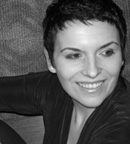Jehanne Dubrow
is a Ph.D. candidate in creative writing at the University of Nebraska-Lincoln and is currently serving as a Sosland Foundation Fellow at the Center for Advanced Holocaust Studies.
Her poetry has appeared in Shenandoah, Gulf Coast Poetry, and The New England Review, among others. She is the author of the chapbook, The Promised Bride (Finishing Line Press).
—Back to Milestones Contents—
|
Cinderella
Mistranslated, fur slippers became glass,
the vair transforming into verre, with no
concern for how the change might change the girl.
And so she tiptoed to the ball, limping
because her feet weren’t used to crystal heels.
She danced despite the blisters on her toes
and blood, a stain inside transparent shoes.
The waltz couldn’t end soon enough. Then guests
surrounded her to admire how she turned
a phrase, how language filtered through her mouth
in careful streams. She said, “How do you do?”
almost as if the words were hers at birth.
The words had taken months to learn (bateau
became a boat, chapeau a hat) and months
before the accent shifted on her tongue
and settled into place. Sipping champagne,
she missed her other fairytale, when warm
fur coverings had cushioned every tread—
the fur, less glamorous than glass but more
secure than this translated, English life
that ends with shards left on the palace steps.
[Originally published in The Hudson Review]

Artist’s Statement
Before my parents joined the U.S. Foreign Service, before I was born, my father was a professor of classical French literature. I was raised with Molière’s Cachez ce sein que je ne saurais voir, Ronsard’s Ronsard me célébrait du temps que j'étais belle, and Baudelaire’s Luxe, calme et volupté. My first name, with its medieval orthography, gestures not only toward Jehanne D’Arc but also Jeanne Moreau, the cerebral screen goddess of one of my parents’ favorite films, Jules et Jim.
I spent most of my childhood overseas, living in countries like Yugoslavia, Zaire, Poland, Belgium, and Austria. It was a world of privilege; I ate beluga caviar at embassy functions and drank tea from porcelain cups but never felt truly at home, always half-American and half something else. Shadowy, indeterminate. Later on, in adulthood, I came to understand my upbringing as one long, extended act of cultural and linguistic translation. My father’s stories about Cendrillon—that she was mistranslated from French into English—returned to me. Although the literary metamorphosis from fur into glass may be apocryphal, it was a narrative I understood, one that spoke to my own work. With “Cinderella” I finally began to create a personal mythos of the Diplomat’s Daughter, a girl able to communicate in many languages yet foreign to herself, her identity splintered like a piece of glass, so fragmented that
even her body hurts.
|


